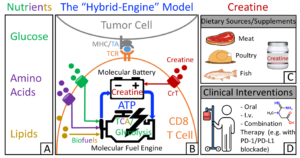Disclaimer: This article is not meant to be medical advice and patients should notify their doctor of any supplement use.
When it comes to creatine, the bottom line of many uses is giving energy to cells that lack it. Enter cancer. We probably all know someone who has had cancer at some point and for those who helped to care for them at home they saw the cumulative effects the disease and treatment takes. Many report fatigue and weight loss prior to the diagnosis while still others see the ravaging effects of lack of appetite and nausea have after treatment begins.

If we simplify this idea, it would be accurate to say that our immune system cells have “lost” their energy to function as well as they are supposed to. In numerous studies, creatine content and energy has been found lacking in CD8 T cells in patients who have cancer (Di Biase and coworkers). It is these very CD8 cells that function to fight off cancer to begin with. Moreover, a great area of current research is finding drugs to hijack the patient’s immune system and cause it to use its natural defenses to fight even more aggressively. In addition to CD8 cell defense, our bodies sometimes use more creatine to infiltrate tumors. One such mechanism is creatine transport SLC6A8 gene expression which encodes a surface transporter controlling the uptake of creatine into cells that infiltrate tumors (Di Biase and coworkers).
One cancer drug, methylglyoxal (MG) was shown to work much better when creatine and ascorbic acid (Vitamin C) were added alongside (Pal and colleagues). In some cases, this combination therapy eliminated visible signs of cancer growth (Pal and colleagues).
🔬 Population Data: Dietary Creatine Intake & Cancer Risk
Several recent large population studies suggest that higher dietary creatine intake is associated with lower risk of cancer in adults:
📊 A study using data from the National Health and Nutrition Examination Survey (NHANES 2007–2018) found that higher creatine intake was linked to a lower overall cancer risk in U.S. adults. For every standard deviation increase in creatine intake, cancer risk dropped by approximately 5%, especially among older adults.
What this means: While observational and correlational (not proof of cause and effect), this data suggests creatine-rich diets may be linked with lower cancer incidence, particularly in older populations — a group at higher risk for cancer.
🛡️ Mechanisms by Which Creatine Might Help Fight Cancer
✔ 1. Enhancing Anti-Tumor Immunity
Research from UCLA shows that creatine is critical for the energy metabolism of CD8+ “killer” T cells — the immune cells that seek out and destroy tumor cells. In mouse models, creatine supplementation helped T cells better suppress tumor growth and improved the efficacy of immunotherapy treatments.
“Creatine-powered T cells can better compete with fast-growing tumor cells for energy, improving their ability to fight cancer,” explains Dr. Lili Yang, senior author of the study on creatine’s role in immune function.
This highlights a potential therapeutic value — not just for prevention, but for enhancing the body’s own immune response against cancer.
✔ 2. Anti-Inflammatory & Antioxidant Activity
Creatine may influence inflammation and oxidative stress — two major drivers of cancer development. Some studies suggest creatine can:
-
Reduce reactive oxygen species (ROS)
-
Modulate inflammatory signaling
-
Support cellular antioxidant defenses
These actions could, in theory, help limit the DNA damage and chronic inflammation that often precede tumor formation.
✔ 3. Protecting Muscle During Cancer Cachexia
Cancer cachexia — a wasting syndrome involving severe muscle loss — dramatically worsens outcomes and quality of life for many patients.
Animal models show that creatine supplementation can protect against cachexia-associated muscle loss, preserving body weight and strength by improving mitochondrial function and reducing excessive protein degradation pathways.
While not directly anti-tumor, this effect improves physical resilience, which is important in cancer care.
⚠️ The Other Side: When Creatine May Not Be Helpful
Despite some promising actions, the role of creatine in cancer is not universally positive — and in some experimental settings it may even support cancer progression.
❗ 1. Potential to Promote Tumor Metastasis
Studies in mouse models have found that creatine supplementation can promote metastasis (the spread of cancer cells to other organs) in colorectal and breast cancer via activation of signaling pathways (Smad2/3 and others).
This research cautions that creatine might help cancer cells survive and spread under certain conditions, particularly in experimental animal models where tumors are already established.
❗ 2. Creatine as an Energy Source for Cancer Cells
Some studies report that cancer cells may upregulate creatine uptake and use creatine/PCr to survive under hypoxia (low oxygen), a common feature of solid tumors. This supports redox balance (preventing oxidative stress) and may help cancer cell survival.
This doesn’t mean creatine “causes cancer,” but it does highlight that tumor metabolism is complex and context-dependent. What all of this means is that it may depend on the type and staging of cancer to better determine if creatine may be helpful or harmful.
See this shorter article on a viable form of creatine.
🧠 Final Advice
If you are:
-
A healthy adult considering creatine — current evidence suggests no clear link to increased cancer risk, and some data hints at protective associations, though more research is needed.
-
A cancer patient or survivor — talk to your oncologist before starting or continuing creatine supplementation, because its effects may vary depending on your cancer type, stage, and treatment plan.
For a longer discussion, check out this article on creatine use in our immune system here
Citation: Kreider RB, Stout JR. Creatine in Health and Disease. Nutrients. 2021 Jan 29;13(2):447. doi: 10.3390/nu13020447. PMID: 33572884; PMCID: PMC7910963.



Leave a Reply